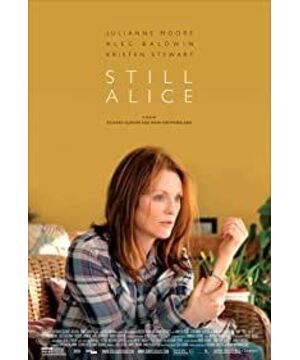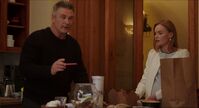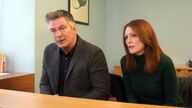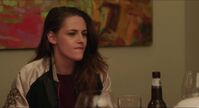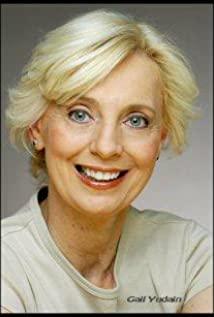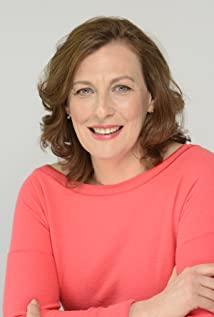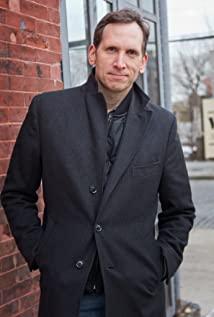To sum up this movie in one word, it should be: Lost - Lost and Lost.
1. Loss - Alzheimer's disease (AD)
This is the disease that is the most common form of Dementia (or more commonly known as Alzheimer's). The communication of nerve cells in the brain allows us to speak, see, move, remember, and allow us to have emotions, think and make decisions. But Alzheimer's patients have impaired nerve cell function, destroying memory and thinking over time, shrinking the brain, and losing the ability to communicate and live a normal life.
It's scary for two things. One, it's irreversible, a disease of no eraser, no fallback, no Ctrl+Z. . There is no drug or treatment that can cure or lessen the disease. After being diagnosed, patients typically live six to twenty years. It is often the elderly who are sick. Who will take care of them? Globally, people with Alzheimer's usually have family members at home to provide care. The financial, mental, and emotional pressure on caregivers is enormous.
Alice in the film belongs to the middle class, and her husband and children can provide financial support after she can't work and hire a nanny. Even so, her husband had to choose between working and caring for her 24 hours a day. Alice has three children, a doctor, a lawyer and a little actor. The first two children are traditionally successful people who, as Alice herself puts it, are "real careers". Just imagine in China, in a society with an aging population, when there is only one child and the child chooses to live in Beijing, Shanghai, Guangzhou and Shenzhen and only go home for a few days during the Spring Festival, who will take care of the elderly patients? Especially empty nesters? There are many families with children in their 60s caring for parents with Alzheimer's disease in their 80s and 90s. Reality, how terrible.
Another scary thing about Alzheimer's is its equality—anyone can get it, and the average age of those who suffer is declining. The average age of 60s and 70s at that time has now dropped into the 50s in some areas. And we, do not know the specific incentives, do not know what kind of prevention will be effective. Due to genetic reasons, Alice suffers from Alzheimer's disease even though she exercises regularly, lives regularly, sleeps well, has no stress, and uses her brain regularly. Some people say that doing more jigsaw puzzles will help, some people say that learning a foreign language has been proven effective, and some people say that don't smoke, don't drink, exercise more, drink more water... But often, as Alice finds helplessly, more Most of the time it's just "unfortunate".
Although the brain is just an organ like the heart, eyes, and skin, not being able to remember things is, as Alice's husband said, a sign that we are getting older. But it's hard to convince ourselves that the loss of memory is like wrinkled skin and a heart no longer beating vigorously.
When Alice and the younger daughter were talking about Angels in America, the younger daughter asked, "You must know someone who died of AIDS, right?" Alice replied: Yes, everyone has such people around them, "We lost a lot of people." These are people who lost their sickness because of disease. And in our day and age, it seems like we're going to lose a lot of people to Alzheimer's.
2. Confused - Who am I?
With the gradual loss of bodily functions, Alice's normal life is disrupted.
She couldn't remember the name, the word, the party she had arranged with others, and she couldn't remember the content of her handout. She couldn't sleep, couldn't recognize the way, put shampoo in the refrigerator, couldn't remember the recipe for bread pudding, couldn't tell what people looked like, forgot the taste of her favorite ice cream, and lost control of her muscles...
This process spans years - her birthday in October in the movie, after being diagnosed, Christmas, another Christmas, another spring, summer and autumn. In this process, it is distressing that she slowly loses herself.
In the beginning, she was such an independent, self-reliant, confident woman. She flew from the east coast to UCLA on the west coast to take a class, and stopped by to see her little daughter. She went to the doctor alone after starting to feel that she had memory problems, without her husband or children.
She was afraid and woke her husband up at four in the morning to tell him how helpless she was. But when she heard the doctor's initial diagnosis, she was calmer than her husband, thinking that the children would come over on their wedding anniversary and could explain the situation to them - while her husband was still trying to deny himself, hoping for a fluke. possible. After the diagnosis, she did not mourn for herself too much, but reminded herself in various ways. However, when she heard that her eldest daughter was positive, she felt deeply guilty. At this time, she is still trying to be strong and still on the podium. Until her class was complained by students, she was still trying to prove that she could improve and be better, and she gave a speech that we had become ridiculously incompetent and funny, but that's not us, it's just our disease. Like any disease, it has a cause and a process and it should be cured,” And please do not think that I am suffering, I am not suffering. I am struggling, struggling to be a part of things, to stay connected to who I once was..."
She didn't want to be a burden to others. So she went to the nursing facility alone to check. When she saw the institution without iron walls but with restrictions everywhere, she was disappointed, even a little desperate. The hardware here is top-notch. There is a newly refurbished library and computer system that has just been upgraded. There are chairs that sound the alarm when patients stand up. Social workers with meaningful activities, there are nurses who record patients' life preferences, there is no day and night curfew, but visitors usually come on Sundays...
...Here, for such a strong woman to choose to go home, she has to become someone who relies on others. She also asked her to type three questions on her phone: her daughter's name, the month she was born in, and the street she lived in. She recorded a video for her future self, saying that if one day she couldn't answer these questions, she could take the pills and go to sleep forever. Speaking of which, our mailboxes and various network identities usually require us to set up similar security questions. If the answer is incorrect, we cannot log in or retrieve the password, and we will lose that identity. For the original Alice, Alice who can't answer these three questions is no longer her.
One morning she woke up from the sofa, opened her eyes and saw the shells on the coffee table, sat up, saw the bracelet on her left wrist, the lettering on the bracelet - Memory Impaired, this Alice has begun to accept Your own is different.
So, who is Alice? What is her role in life?
A. The woman The scene
I was very impressed with was at first Alice blaming her husband for not telling her about funding her little daughter's troupe. The husband tells her "I told you" and Alice affirms "you didn't". The husband said, "I remember I told you." Alice still said calmly while drinking water, "No, you didn't." If we hadn't known the plot, we might have guessed like Alice's colleagues and friends that she just had menopause.
Yes, as a woman, the first reaction to such a dialogue is often vexatious. Alzheimer's is more common in women than in men—as can be seen from Alice seeing many grandmothers and only one grandpa in the care facility. And, as the movie shows, women are often the last caregivers for patients—a responsibility that is taken on by Alice's young daughter, not her husband. This is also true in real life, as well as in the cultural background of different countries.
Therefore, Alzheimer's disease is particularly cruel to women.
B. Lecturer
She studies linguistics—the irony of career-setting. She studies how children babble from 18 months to two and a half years old. She said, "Most children can use and understand their native language before the age of four. How do they accomplish this incredible feat without lessons and homework and feedback?" She said "memory and computation - that is the very essence of communication.” And the language and communication that Alzheimer’s disease takes away is precisely the self-knowledge she is most proud of.
As she described her feelings for her youngest daughter, she said, "I feel like I can't find myself. I've always been so defined by my intellect, my language, my articulation, and now sometimes I can see the words hanging in front of me and I can't reach them. And I don't know who I am and I don't know what I'm gonna lose next." Back then she was able to say all kinds of tongue-in-cheek nouns, but now She forgot what the highlighter said and could only say the yellow thingy. She used to give lectures at the Ivy League, and now it takes three days to prepare the speech and she needs to highlight the places she said to avoid repeating a sentence. She has so many friends, but now she is afraid to attend dinner, because she is afraid of forgetting other people's names And embarrassing. She said she'd rather have cancer, at least she wouldn't feel so ashamed. This disease made the elegant linguistics lecturer disappear.
c. wife
She is a very kind wife. The picture shuttles through pumpkins, mushrooms, milk, carrots, eggs, and ovens. From time to time, she goes to the small blackboard to compare the words she has recited, chat with the children, and make a big Christmas dinner. She can give advice and advice while her husband is researching the subject. She cherishes the time and memory of their encounter. After her diagnosis, she repeatedly mentioned that she hoped her husband could take a year off, because she was worried that "after a year, I will not be me anymore." Some people don't understand what Alice's husband is doing, and why he doesn't help Alice find Phone, don't understand why he didn't fulfill his promise of I'm here.
But in fact, as Alice's closest person, he should be under the greatest pressure. The originally wise wife had to start relying on herself in every way, and she couldn't even get dressed, tie her shoelaces, and go to the bathroom by herself. The former strong wife would lean against his shoulder weakly. When he asked her about the taste of ice cream, her Okay was a little flattering. He asked, "Do you really want to leave here?" She thought he was asking about the ice cream shop, but it turned out that There will be some anxiety and say I haven't finished eating, do we have to go? He wanted to take her to Minnesota, but she was reluctant to leave. Many Alzheimer's caregivers report that it is not the inconveniences of daily life that make them most anxious and unbearable, but the mental distress. On the one hand, the person they know and love the most is slowly disappearing, and the body of that person is slowly starting to not recognize him; on the other hand, the patient often repeats a question, for example, Alice asks her husband when his meeting is, and the day of the little daughter Come back and ask the youngest daughter what the name of the person in that company is. This repetition is often exhausting for the caregiver. Therefore, Alice's husband's choice is understandable-although as an audience, it still feels sad.
D. Mother
Alice was a seriously successful mother of most people, she raised a doctor, a lawyer, and although her youngest daughter wanted to be an actress and didn't want to go to college, she went to great lengths to convince her. She pointedly pointed out that her younger daughter's previous role in the troupe was "pay to act", trying to show her the cruelty of reality and paving a way for her to have a backup plan, but her younger daughter always refused. As a mother, she gave them life, but when she found out that her genes were defective and caused 100% of the disease in her children, her sadness can be imagined.
When the eldest daughter successfully gave birth to a twin, she timidly asked herself if she could hug her grandson, but everyone - including the audience - was obviously worried about whether she would be able to hold the baby. This kind of denial of their abilities by the outside world actually causes more harm in many cases.
E.
The mother and sister of daughter Alice died in a car accident when she was 18. Her father later died of liver disease. She said they were not very close in her father's later years either. Her life seems to revolve around her current family and her career.
However, her short-term memory was greatly damaged by Alzheimer's disease, but she retained a small piece of long-term memory, which was dusty in the photo album years ago. She put on the butterfly necklace that her mother gave her again, because although butterflies have short lives, their short lives are extremely beautiful and splendid. She said she thought of her mother, sister and herself. The beach when she was young, no mobile phone, no Skype, no Google, there are only pictures from the film, ripples in the lake of her memory.
3. Forget-me-not Memorizing the words of the text in
middle school is a very fulfilling thing. Then with computers and smartphones, we no longer need to use our brains to memorize many things. The phone number was remembered in my mind back then, but now I have to open the address book to confirm whether there is a mistake. In the past, I was able to cite scriptures, but now I am more accustomed to searching and copying and pasting directly. Back then, I was able to read long essays, but now I often resort to 140-character Weibo for entertainment. The way we look and feel is in people's memory back then, but now, the question of who we are is more often in the roles we create for ourselves in the virtual world.
Life is smooth sailing Life is everything but tragic Alice shows us the fragility of life and allows us to pause and think about life - what is fleeting? What is eternity? What is easily lost? What will not be forgotten?
In Angels in America the younger daughter read to Alice, "Nothing is lost forever."
Alice said in the video of herself, "Hi Alice, I'm you. And I have something important to say to you."
I want to say to her, "You are Still, and Always, Alice."
=====
Note: There is currently a course on Coursera offered by Johns Hopkins University
View more about Still Alice reviews


